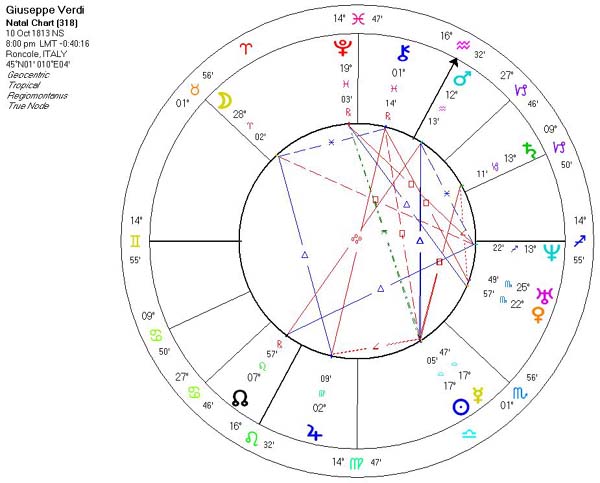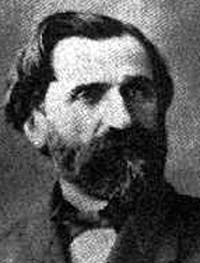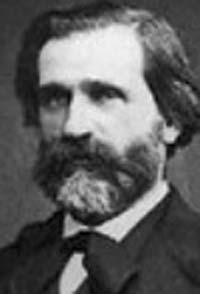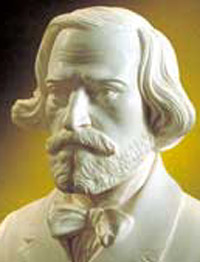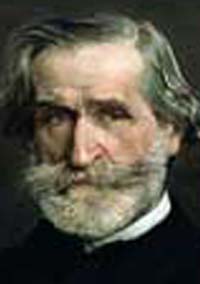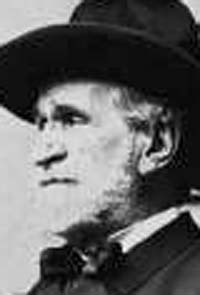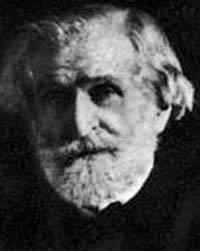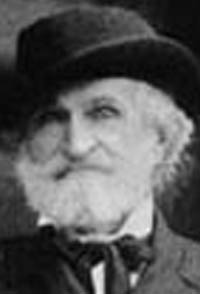Copyright Michael D. Robbins 2005
Astro-Rayological Interpretation & Charts
Quotes
Biography
Images and Physiognomic Interpretation
I adore art... when I am alone with my notes, my heart pounds and the tears stream from my eyes, and my emotion and my joys are too much to bear.
Our mistake, you see, was to write interminable large operas, which had to fill an entire evening. And now along comes someone with a one or two-act opera without all that pompous nonsense - that was a happy reform.
You may have the universe if I may have Italy.
“I wish to have a modest funeral, celebrated at daybreak or at the evening Ave Maria, without any singing or playing. Two priests, two candles and a Cross will suffice."
VERDI GIUSEPPE FORTUNINO FRANCESCO came of poor parents in Roncole of Busseto on the 10th of Octobre 1813. He soon developed an inclination to music, his first teacher was Pietro Baistrocchi, Roncole organist; he practised plying a modest spinet while helping his parents with their shop, a modest tavern; at twelve he went to Busseto and started working for the shop-keeper Barezzi, who then became his protector, while also studying music with the band teacher Provesi and latin with the canon Seletti.
He went to Milan thanks to a pawnshop grant and Barezzi's financial support: at ninetten he tried to enter the conservatory, however he was not admitted(!!!), he thus continued his studies with the teacher Lavigna.
When he came back to Busseto he was assigned music composer of the municipality and conductor of the band.In 1835 he married his protector's daughter Margherita Barezzi who died together with their two children during the 1838-1840 years in Milan, where the Verdi family has moved.
His first opera was "Oberto Conte di San Bonifacio" (1839) successfully performed at the La Scala Theatre in Milan. His second opera "Un giorno di regno"(1840)a comic work, was a complete fiasco thus adding more pain to the family misfortune.
His extraordinary production of works began just at that time. His untiring and prodigious activity did not succomb even to the old age which he spent in Villa Sant'Agata, very close to Busseto, together with the inseparable and faithful Giuseppina Strepponi, who had been living with him since 1849. Giuseppe Verdi died in Milan on the 27th of the January 1901 and he was burried in the Home for Musicians he himself founded.In the year eighteen-thirteen, on the twelfth of October, at nine o'clock, before us the Vice-Mayor of the town council of Busseto, "Ufficiale dello Stato Civile" of the above town council and the "Dipartimento del Taro"; appeared before us Verdi Carlo aged twenty-eight, innkeeper, living in Roncole; presented to us a boy child born on the tenth of the current month at eight o'clock, announced by himself and his wife Luisa Uttini, spinner, living in Roncole and to whom he has declared in giving the names of Giuseppe, Fortunino, Francesco.
The above declarations and presentations were made in the presence of Romanelli Antonio, aged fifty-one, usher of the town-council, and Carità Giacinto, age sixty, porter; both living at Busseto.
After having read the following certificate to the person making this declaration and the witnesses, they undersigned with us as follows:
Verdi Carlo - Antonio Romanelli - Giacinto Carità - the Vice-Mayor Vitali.“I wish to have a modest funeral, celebrated at daybreak or at the evening Ave Maria, without any singing or playing. Two priests, two candles and a Cross will suffice."
The last will of Giuseppe Verdi, struck by cerebral palsy on 21st January in the first-floor suite of the Grand Hotel in Milan who died at 14.50 on 27th January 1901, was carried out to the letter, as we are told an the altar boy of the church of San Francesco da Paola who was present at the funeral: "The funeral cortège moved through a foggy morning about half past seven, with a third-rate funeral hearse drawn by a modest little horse preceded by the priest Don Modesto Gallone, accompanied by a single altar boy. The procession moved with difficulty through the crowds which flanked it along Via Manzoni... No song, not even the smallest sound: an eerie silence reigned. Everybody raised his hat as the cortège passed and comments on the contrast between the glory of Verdi's existence and the squalor of the transport of his corpse were made with eyes rather than words."
After this first funeral rite, the people who had followed his last days (day by day a silent, motionless crowd had held vigil beneath the windows of the hotel waiting for news from the press room set up in the hall) wanted to bid him farewell and display their veneration for the maestro.
The Government decreed that on the thirtieth day after his death the mortal remains of the Maestro and his beloved companion, Giuseppina Strepponi, were to be translated from the Monumental Cemetery of Milan to the crypt of the Musicians' Rest Home, perhaps one of Verdi's finest creations. On 27th February, at eight o'clock in the morning, the bodies were exhumed and laid on a specially-built monumental hearse. The huge crowd, more than three hundred thousand people, waved tricolours, cheered and sang. And before the cortège moved off Arturo Toscanini conducted nine hundred choristers, accompanied by the orchestra of La Scala in "Va pensiero" from Nabucco in the presence of the leading dignitaries of the State and of Puccini, Mascagni, Leoncavallo and Giordano.As you read you may be expecting to find long eulogies and discussions on the Art of the Great Composer, but I will leave this task to all those who surely devote themselves with greater authority to a study of Giuseppe Verdi's music. I would rather introduce you to another, little-known, aspect of Verdi the man: his love of fine cuisine.
Verdi grew up among the genuine aromas of homely, old tastes of the grocery and inn that his parents ran at Roncole di Busseto. And Antonio Barezzi, the first man to believe in Verdi's talents, the man who watched over his musical education and gave him his daughter Margherita as wife, was an important wholesaler of foodstuffs, wines and liquors.
Though they became more refined over the years Verdi's tastes were always simple, country ones.
In periods of intense work he could do without lunch and dinner and relied almost exclusively on coffee, a beverage that he adored and sought out carefully in the best shops.
But as soon as he managed to free himself of the worries of publishers, theatre directors and singers he dedicated himself passionately to food. He was often to be seen poking about the market stalls at seven o'clock in the morning, personally involved in seeking out supplies for his personal chef or for friends who were known to be excellent cooks.
During one of his stays in Genoa, on an excursion to Voltri, he asked his friend Montuoro to cook his beloved "maccheroni alla Napoletana": "... Montuoro did not trust the provisions they would have found in Voltri and accepted on condition that he could do the shopping personally in town. Verdi merrily accompanied him through the winding alleys of Genoa and had to carry packs of butter, cheese and tomato sauce whilst his friend held in his arms a well-wrapped pack of maccheroni with the affection of a father holding a little baby.
When they arrived in Voltri, with Verdi's wife and Mariani, they wanted to eat, and Verdi had to light the fire in the kitchen, blowing on it for a quarter of an hour, while Montuoro, with the reverential gravity of a Neapolitan, prepared the ingredients for the maccheroni sauce helped by Mariani and with a little assistance from Signora Verdi, too..."
In Genoa, a town he appreciated for its cuisine and especially for the discretion of its inhabitants who venerated him without importuning him, Verdi had a friend, Giuseppe De Amicis, whose job it was to see to the supplies when the composer was out of town.
"My dear De Amicis, I beg you (pardon me for bothering you...) to go immediately to Romanengo and have him send here to Milan two crates of his finest candied fruits, fondants etc."
"My dearest De Amicis ... when you go out do me the favour of calling on Giavotto and ask him why I still have not received the Marsala wine, sent express and paid for on Monday..."(b. Roncole, 9/10 Oct 1813; d. Milan, 27 Jan 1901), Italian composer. He was born into a family of small landowners and taverners. When he was seven he was helping the local church organist; at 12 he was studying with the organist at the main church in nearby Busseto, whose assistant he became in 1829. He already had several compositions to his credit. In 1832 he was sent to Milan, but was refused a place at the conservatory and studied with Vincenzo Lavigna, composer and former La Scala musician. He might have taken a post as organist at Monza in 1835, but returned to Busseto where he was passed over as maestro di cappella but became town music master in 1836 and married Margherita Barezzi, his patron's daughter (their two children died in infancy).
Verdi had begun an opera, and tried to arrange a performance in Parma or Milan; he was unsuccessful but had some songs published and decided to settle in Milan in 1839 where his Oberto was accepted at La Scala and further operas commissioned. It was well received but his next, Un giorno di regno, failed totally; and his wife died during its composition. Verdi nearly gave up, but was fired by the libretto of Nabucco and in 1842 saw its successful production, which carried his reputation across Italy, Europe and the New World over the next five years. It was followed by another opera also with marked political overtones, I lombardi alla prima crociata, again well received. Verdi's gift for stirring melody and tragic and heroic situations struck a chord in an Italy struggling for freedom and unity, causes with which he was sympathetic; but much opera of this period has political themes and the involvement of Verdi's operas in politics is easily exaggerated.
The period Verdi later called his 'years in the galleys' now began, with a long and demanding series of operas to compose and (usually) direct, in the main Italian centres and abroad: they include Ernani, Macbeth, Luisa Miller and eight others in 1844-50, in Paris and London as well as Rome, Milan, Naples, Venice, Florence and Trieste (with a pause in 1846 when his health gave way). Features of these works include strong, sombre stories, a vigorous, almost crude orchestral style that gradually grew fuller and richer forceful vocal writing including broad lines in 9/8 and 12/8 metre and above all a seriousness in his determination to convey the full force of the drama. His models included late Rossini, Mercadante and Donizetti. He took great care over the choice of topics and about the detailed planning of his librettos. He established his basic vocal types early, in Ernani: the vigorous, determined baritone, the ardent, courageous but sometimes despairing tenor, the severe bass; among the women there is more variation.
The 'galley years' have their climax in the three great, popular operas of 1851-3. First among them is Rigoletto, produced in Venice (after trouble with the censors, a recurring theme in Verdi) and a huge success, as its richly varied and unprecedentedly dramatic music amply justifies. No less successful, in Rome, was the more direct Il trovatore, at the beginning of 1853; but six weeks later La traviata, the most personal and intimate of Verdi's operas, was a failure in Venice – though with some revisions it was favourably received the following year at a different Venetian theatre. With the dark drama of the one, the heroics of the second and the grace and pathos of the third, Verdi had shown how extraordinarily wide was his expressive range.
Later in 1853 he went – with Giuseppina Strepponi, the soprano with whom he had been living for several years, and whom he was to marry in 1859 – to Paris, to prepare Les vêpres siciliennes for the Opéra, where it was given in 1855 with modest success. Verdi remained there for a time to defend his rights in face of the piracies of the Théâtre des Italiens and to deal with translations of some of his operas. The next new one was the sombre Simon Boccanegra, a drama about love and politics in medieval Genoa, given in Venice. Plans for Un ballo in maschera, about the assassination of a Swedish king, in Naples were called off because of the censors and it was given instead in Rome (1859). Verdi was involved himself in political activity at this time, as representative of Busseto (where he lived) in the provincial parliament; later, pressed by Cavour, he was elected to the national parliament, and ultimately he was a senator. In 1862 La forza del destino had its première at St Petersburg. A revised Macbeth was given in Paris in 1865, but his most important work for the French capital was Don Carlos, a grand opera after Schiller in which personal dramas of love, comradeship and liberty are set against the persecutions of the Inquisition and the Spanish monarchy. It was given in 1867 and several times revised for later, Italian revivals.
Verdi returned to Italy, to live at Genoa. In 1870 he began work on Aida, given at Cairo Opera House at the end of 1871 to mark the opening of the Suez Canal (Verdi was not present): again in the grand opera tradition, and more taut in structure than Don Carlos. Verdi was ready to give up opera; his works of 1873 are a string quartet and the vivid, appealing Requiem in honour of the poet Manzoni, given in 1874-5, in Milan (S Marco and La Scala, aptly), Paris, London and Vienna. In 1879 the composer-poet Boito and the publisher Ricordi prevailed upon Verdi to write another opera, Otello; Verdi, working slowly and much occupied with revisions of earlier operas, completed it only in 1886. This, his most powerful tragic work, a study in evil and jealousy, had its première in Milan in 1887; it is notable for the increasing richness of allusive detail in the orchestral writing and the approach to a more continuous musical texture, though Verdi, with his faith in the expressive force of the human voice, did not abandon the 'set piece' (aria, duet etc) even if he integrated it more fully into its context – above all in his next opera. This was another Shakespeare work, Falstaff, on which he embarked two years later – his first comedy since the beginning of his career, with a score whose wit and lightness betray the hand of a serene master, was given in 1893. That was his last opera; still to come was a set of Quattro pezzi sacri (although Verdi was a non-believer). He spent his last years in Milan, rich, authoritarian but charitable, much visited, revered and honoured. He died at the beginning of 1901; 28,000 people lined the streets for his funeral.
Giuseppe Fortunino Francesco Verdi (October 10, 1813 - January 27, 1901) was one of the great composers of Italian opera. His work was already very popular during his lifetime and remains so today.
Born in the Duchy of Parma in Le Roncole, at that time under Napoleon's occupation, he moved to Busseto in 1824 where he started his musical studies with Ferdinando Provesi. Verdi is also known as "the swan from Busseto".
He composed an overture for Gioacchino Rossini's Il Barbiere di Siviglia (The Barber of Seville), then he moved to Milan, but he was not accepted at the conservatory, so he had private studies with Vincenzo Lavigna.
In 1838, the leading European musical editor Giovanni Ricordi bought his copyrights and this business would last for the rest of his life, passing through the generations of Ricordi's family, with Tito and Giulio Ricordi being considered as part of his family.
In 1842 his first real success was Nabucco, which followed two earlier operas, Oberto, Conte di San Bonifacio (opened in Milan on November 17, 1839) and Un Giorno di Regno which was his only attempt at writing a comedy until Falstaff. Un Giorno di Regno was a decided failure and no wonder, it was written shortly after his first wife and child died.
Nabucco premiered at La Scala theatre, with Giuseppina Strepponi, soprano, in the part of Abigaille. The singer became his mistress and, long after the death of his first wife, Verdi would marry her.
After the success of I Lombardi alla Prima Crociata (Milan, February 11, 1843), also increased by some aspects of the political situation (see below), Ernani scored a triumph in La Fenice theatre in Venice.
The following year, Giovanna d'Arco and Attila would enforce his fame, but Verdi did not find the rendering of his scripts by La Scala sufficient, so he asked Ricordi not to allow any more productions of his opera in Milan; Attila, Alzira and Macbeth were premiered in other Italian towns. I Masnadieri was seen in London.
While Milan was lost and reconquered by the Austrians, Verdi wrote Il Corsaro, La Battaglia di Legnano, and Luisa Miller, and started a Manon Lescaut which he would never finish. After the polemics for his Stiffelio, in 1851 Rigoletto was a triumph in Venice, and in 1853 he had another great success with Il Trovatore (in Rome) but a very sad fiasco for the first soirées of La Traviata.
Other famous operas follow in this period: Les Vêpres siciliennes (I Vespri Siciliani) (Paris), Aroldo (a revision of Stiffelio), Simon Boccanegra (La Fenice), and Un Ballo in Maschera (which was censored). He then assisted at the birth of the Kingdom of Italy (he was also elected Deputy). La Forza del Destino had its premiere in St. Petersburg in 1862 and Don Carlos was first presented in Paris.
It was in 1872 that Aida was performed at La Scala with great success. It had been composed for the Egyptian Khedive, on the occasion of the inauguration of a new opera house in Cairo, and not for the opening of the Suez Canal as often mentioned.
Some troubles occurred in his relationship with the Ricordi editors, who were suspected of irregularities concerning huge amounts of money. However, a few years later it was Giulio Ricordi who proposed Otello, which had its premiere in 1887. Falstaff would follow after other revisions of older works.
Verdi's works happened to have some resonances with Italian nationalism (e.g. "Chorus of the Hebrew Slaves" in Nabucco, also known as Va' Pensiero (lyrics with translation here pensiero - MP3: [1]), which still in modern times has repeatedly been proposed as a possible Italian national anthem - obviously, there is no reference to racism). More curiously, someone discovered that his surname, Verdi, is the acronym of Vittorio Emanuele Re D'Italia (Victor Emmanuel King of Italy), when Milan (still under Austrian occupation) was beginning to consider supporting Victor Emmanuel's effort in Italian reunification, as it afterwards did. Clandestine partisans started therefore plotting to have this King of Sardinia conquer Milan and, due to severe Austrian censorship, this campaign was conventionally called "Viva VERDI" (Verdi stands for Vittorio Emmanuelle, Re D'Italia. The phrase means 'Long live Victor Emmanuelle, king of Italy'). The composer was aware of this use of his name and is supposed to have consented. Other references to political events have been seen in his I Lombardi.
He died of a stroke in 1901 in Milan after the completion of his "Casa di Riposo", a retirement villa for poor artists. His funeral was extremely well attended, and a quarter of a million mourners were present to show their respect to one of the most important figures in Italian music.
